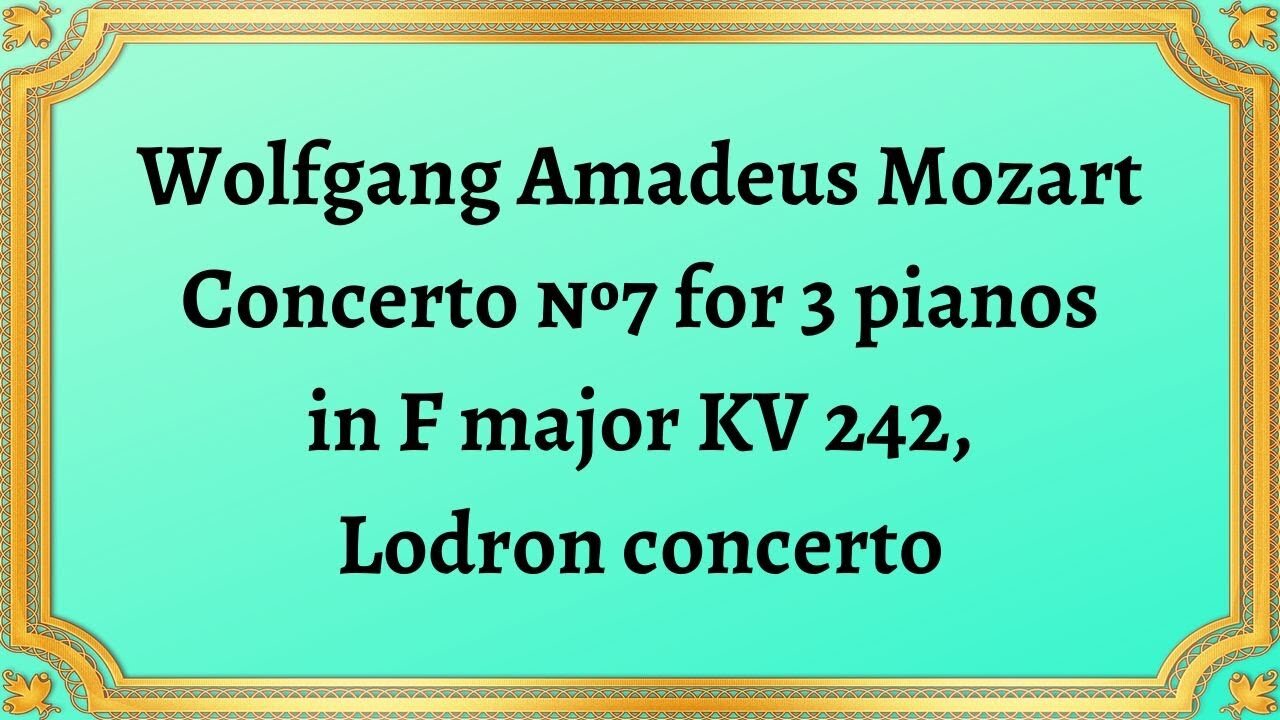Premium Only Content

Wolfgang Amadeus Mozart Concerto №7 for 3 pianos in F major KV 242, London concerto
#Mozart#Chamber_music#Classical_music#Concerto#musical_composition
Publication date 1955
Duo Schnabel: Karl-Ulrich and Helen Schnabel-Fogel, pianos
Ilse von Alpenheim, piano
Wiener Symphoniker c.b. Bernhard Paumgartner
Wolfgang Amadeus Mozart, an eminent composer of the Classical era, left an indelible mark on the world of music with his numerous symphonies, operas, and concertos. Among his remarkable works, Concerto No. 7 for 3 Pianos in F Major, KV 242 stands out as a captivating composition.
Mozart composed Concerto No. 7 for 3 Pianos in F Major, KV 242 in Vienna, Austria, in 1776, during the height of his prodigious career. This period witnessed Mozart's incredible creativity and a shift towards larger and more diverse instrumental ensembles. The concerto is a testament to Mozart's innovative spirit and his pursuit of musical excellence.
The concerto consists of three movements, adhering to the traditional fast-slow-fast format commonly found in classical concertos:
Allegro: The opening movement sets a lively and exuberant tone, characterized by the virtuosic interplay between the three pianos. The themes are introduced and developed through captivating melodic passages, demonstrating Mozart's mastery of compositional techniques.
Adagio: The second movement offers a stark contrast to the energetic first movement. It unfolds as a graceful and introspective dialogue between the pianos and the accompanying orchestra. Mozart's exquisite melodic lines, delicate harmonies, and expressive nuances evoke a sense of profound beauty and emotional depth.
Rondeau: Allegro: The final movement returns to a spirited tempo, showcasing Mozart's penchant for rhythmic vitality and lively melodies. The three pianos engage in a spirited conversation, intertwining their musical voices with dazzling virtuosity. The movement culminates in a brilliant and triumphant finale, leaving the audience in awe of Mozart's compositional genius.
Mozart's Concerto No. 7 for 3 Pianos in F Major, KV 242 continues to captivate audiences and musicians alike, owing to its enduring appeal. Here are a few reasons why this composition remains a beloved and celebrated work:
Mastery of Ensemble Writing: The concerto showcases Mozart's ability to write for multiple pianos, harmoniously blending their timbres and creating a rich and balanced texture. The interplay between the three pianos creates a dynamic and engaging musical dialogue, further heightening the overall musical experience.
Technical Brilliance: The composition demands exceptional technical proficiency from the pianists, with intricate passages, rapid scale runs, and challenging hand crossings. The virtuosic nature of the concerto adds excitement and intensity, captivating both performers and listeners.
Expressive Range: Mozart's Concerto No. 7 encompasses a wide emotional spectrum, ranging from exuberant joy to poignant introspection. This emotional depth, combined with Mozart's unmatched melodic craftsmanship, allows the composition to resonate with audiences on a profound level.
Wolfgang Amadeus Mozart's Concerto No. 7 for 3 Pianos in F Major, KV 242 stands as a testament to the composer's brilliance and artistic vision. Its historical significance, intricate musical structure, and timeless appeal continue to make it a cherished piece in the classical repertoire. By exploring this musical gem, we gain a deeper appreciation for Mozart's genius and the enduring power of his compositions. Experience the magic of Concerto No. 7 and embark on a musical journey that transcends time
-
 6:07
6:07
Classical music_Music Inspiration
26 days agoJoseph Haydn Piano Sonata in D Major, Hob. XVI:51
721 -
 2:42:30
2:42:30
TimcastIRL
6 hours agoKash Patel CONFIRMED, Deep State PANICS, Mitch McConnell To RETIRE w/ Kevin Smith | Timcast IRL
135K241 -
 1:04:47
1:04:47
Candace Show Podcast
10 hours agoBecoming Brigitte: The Epilogue
93.5K124 -
 3:43:51
3:43:51
Alex Zedra
5 hours agoLIVE! Come Play WoT with me!
26.6K5 -
 LIVE
LIVE
Drew Hernandez
13 hours agoDOGE EXPOSES $2 BILLION SCHEME LINKED TO STACEY ABRAMS?!
2,655 watching -
 1:27:59
1:27:59
Kim Iversen
8 hours agoRFK Jr Declares No More Cheetos on Welfare? | Yale Confirms Long Covid Is Actually Vaccine Injury!
72K97 -
 1:08:43
1:08:43
The Charlie Kirk Show
5 hours agoTHOUGHTCRIME Ep. 74 — Charlie's Campus Return? Robo-Butlers? Garden of American Heroes?
67.8K16 -
 1:09:53
1:09:53
Slightly Offensive
6 hours ago $5.29 earnedIs the US Headed for MORE WAR Under TRUMP? | Guest: Scott Horton
36.8K9 -
 58:29
58:29
The StoneZONE with Roger Stone
5 hours agoRoger Stone Hails Confirmation of Kash Patel, Trashes Schiff for Attacks On Patel | The StoneZONE
43.8K13 -
 48:44
48:44
Man in America
11 hours agoA MASSIVE Global Financial Reset Is Coming—Are You Ready?
32.9K6